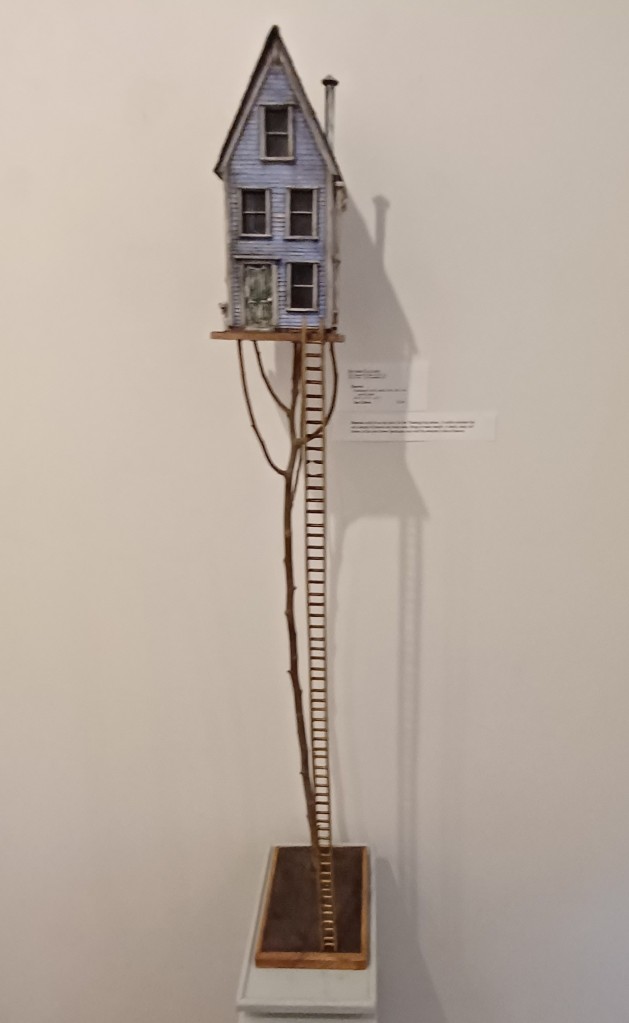Elissa Barnard had some very kind words to say about "Wool and Wool" at Secord Gallery.
As well as Sara MacCulloch's show at Katzman Art Projects, the Craig Gallery with Declan O’Dowd and Carley Mullally, the Halifax Central Library with Marilyn Smulders and painter Danny Abriel
https://nsreviews.blog/2023/11/22/all-the-worlds-a-vision-for-1-artist-and-3-sets-of-2/
WOOD AND WOOL: Ian Gilson and Laura Kenney
Hooked rug artist Laura Kenney and toy maker/assemblage artist Ian Gilmore are both playful and political in their work.
Their shared exhibit at Secord Gallery is a wonder of detail and material magic and is strong on thematic connections. Both comment on the housing crisis, environmental challenges and the threat to lighthouses while Kenney spins off into a more feminist direction and Gilmore into moods and an exploration of where the world of the child meets that of the adult.
There is a delicious irony in Kenney’s use of a traditional, tactile, homespun domestic art in rugs that are warming to the foot and the heart to comment on social and political issues.
Her character Judy, party drawn from rural Maritime life and folk art, is a tall, thin woman with red hair pulled back in a bun. She is faceless, wears a long black dress and is a feminist keen on social justice and setting things right. Judy has been a saviour of lighthouses and a critic of the commercialization of Maud Lewis for the profit of others.
Maud Lewis’s three cats, framed on Judy’s wall, look on gleefully as Judy irons a white, suited man on her ironing board in Straighten Him Out.
Kenney’s sense of humour and her brilliant use of colour with gorgeous banded backgrounds make her imagery delightful and seemingly carefree. As gorgeous as the flames and purple and blue banded sky are in Putting Out The Fires, the depiction of Judy using a watering can to put out this past summer’s wildfires is disturbing.
The cheerful colours in window panes and pink flowers on window sills in Our Home on Native Land belie the socio-political comment Kenney is making about colonization and the loss of Indigenous land and culture. The door of the quintessential white, country house is red.
Gilson has a darker more fantastical edge than Kenney. His is the world of making what’s needed from what’s at hand, from digging in the tool box and roaming in the wood shed or the attics of old houses. He builds an enchanting world rooted in story and informed by clowns, carnivals, architecture and toys.
Gilson’s works are delightful in their miniature aspect and in the “how” of his construction. He builds a tiny towering lighthouse out of a jumble of miniature, handmade tables and chairs with a lit desk lamp as the lighthouse’s light. The artwork Poltergeist is an elegant vertical structure of barely connected, perfectly constructed, doll house chairs reaching up to heaven.

Note the exquisite detail in the miniature door in Ian Gilson’s idea of heaven in Heaven, of reclaimed wood, metal, wire, zinc, paper, acrylic paint, wax.
Gilson’s toys are comical and not for the faint of heart. The Funt Toys series
of sculpted then cast and hand-painted and hand-packaged objects
includes Billy Bacon – a strip of bacon with eyes and a cigarette in its
mouth. I won’t describe Meat Landscape.
The Rabbits in the Secret Toys for Lonely Children series are wonderful in a creepy way. These mutant, long-eared stuffies have perfectly crafted, cranky, adult faces, sculpted hands and little furry bodies. They look like fairytale creatures or the Japanese Monchhichi monkeys.












.jpg)


%20%E2%80%A2%20Instagram%20photos%20and%20videos.png)
.jpg)

%20%E2%80%A2%20Instagram%20photos%20and%20videos.png)





